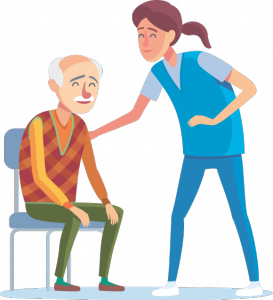“The cancer has spread … there’s nothing else they can do…”
“I had hoped to live long enough to see my grandson graduate…”
“My wife wants me to move back home for the end… What do you think?”
Every healthcare professional hears patients talk about their approaching death. Patients are usually aware of their condition. Sooner or later—and possibly more often than you expect—you’ll be caring for patients who are seriously ill. In fact, they are dying.
Death is the final stage of life. It happens to every living thing, from plants to animals to humans. We know this, and yet it’s still difficult. As a CNA, you may be the person who gives the most care to these patients. You may be the one they trust and talk to the most.
All too often, those around a very sick or dying person feel awkward. They don’t know what to say, so they avoid the person or any talk of what is clearly happening. This can include the medical professionals who are caring for the person. The result? The person feels isolated and ashamed.
Often those around a very sick or dying person feel awkward. They don’t know what to say, so they avoid the person or any talk of what is clearly happening.
What can you do when you’re caring for these very special patients? Maybe you feel awkward or unsure of what might be helpful. Even if being near death is new to you—and for most people, it is—let’s find ways to make you feel more comfortable and supportive.
- Let the patient set the tone
- Remember that the stages of grief don’t proceed in a linear way
- Do not ignore the patient
- Don’t minimize or preach
- Consider the family, too
- What would you want?
Six tips that will help the patient, the family, and you cope with the situation
- 1
Let the patient set the tone.
Some patients are quite open about their illness, while others remain in denial and anticipate “a miracle” at any moment. In the 1960s, when Dr. Elisabeth Kübler-Ross first studied and developed her now-famous model of the five stages of grief, she was thinking about the grief process of dying patients, not of the families. (Only later did she begin to think about how those same stages might occur with other kinds of loss.)
It’s very important to remember that all of us are entitled to our own end-of-life journeys. Don’t contradict the patient who is certain that “any day things will turn around” but don’t encourage the person either. You might say something like, “That would be fantastic. Let’s see what we can do to help you feel better now.”
- 2
Remember that the stages of grief don’t proceed in a linear way.
Patients may seem to have accepted their impending deaths, making plans for their families after they are gone. But then they may fall back into figuring out how to “buy” a few more months because they aren’t ready to die just yet. Or they may be angry because they feel cheated out of their future. Then they may return to acceptance.
Accept the patients wherever they are at any given moment. Very few people, even those with strong religious or spiritual beliefs, are ready to leave their families and lives. Most people have reasons to remain on earth, and most retain a sense of hope to the very end.
- Listen
listen, listen, listen!
3Do not ignore the patient!
Sometimes, when a patient receives a cancer diagnosis or is told the diagnosis is terminal, the patient’s family and friends don’t know what to say. So they say nothing or even avoid the patient. This makes the patient feel like an outcast at a time when the person absolutely needs support.
This is your chance to be a role model for the patient’s family and friends at this crucial time. Ask the patient how he or she is feeling. Listen, listen, listen. Patients may want to talk about their fears, but they may also have a craving for a favorite food. They may want to reminisce, research treatment options, or simply go for a walk. Tell them a funny story you heard on the radio. Turn on their favorite TV show. Most patients want “normal” for as long as possible.
- 4
Don’t minimize or preach.
When you say, “Don’t worry” or “You’ll feel better soon,” you are putting yourself before the patient. Don’t worry? Really? If you say such things, you’re really saying, “I don’t want to talk about this difficult subject. Let’s pretend it’s not real.” Telling a patient how he or she should feel or act is the same as preaching. “Cheer up!” or even worse, “Yeah, that’s why I never smoked” are two hurtful ways of completely dismissing the patient.
You will never, ever understand the patient’s situation or feelings, so don’t say, “I know how you feel.” Don’t tell patients to eat healthier, meditate, or maintain an optimistic attitude. They may decide to do these things, but don’t force them. They probably already feel guilty or defeated and don’t need to be reminded of their shortcomings or what may have caused their condition.
- 5
Consider the family, too.
Because you’re a direct caregiver, you will certainly have some involvement with the patient’s family. Of course, you will offer support and listen to their concerns. Their range of emotions may be similar to the patient’s, or they may be in a different place. They may confide in you, “Why doesn’t he fight harder?” or the opposite, “Why doesn’t she accept that she’s dying?”
Talk to the family honestly and kindly. Encourage them to talk to the patient about things other than cancer or the terminal illness. Patients get exhausted when visitors always ask questions or focus on the illness instead of talking to them as the persons they have always been. Can the patient go for an outing? Can the family gather for a celebration? Is there an upcoming holiday or event to plan for? Any family news or neighborhood gossip?
- 6
What would you want?
Often, the best way to approach an uncomfortable situation is to think about what you would want for yourself or a loved one at the end of life. You’d probably want friendly and compassionate care. You’d also want to visit your favorite people and laugh over funny memories. You’d want to enjoy every day for as long as you could. You’d want to know that your life mattered.
It’s the same for everyone. And that’s why your actions matter more than ever. You have the privilege of being with someone at the end of the person’s life. Just as birth is a time of celebration, death is also an important event. Approach it directly and appreciate the role you have.
Do what you would want for yourself and your loved ones. You will never be wrong.
Enhance your communication skills with our interactive CNA practice test, which includes scenarios similar to real-life patient interactions, preparing you for sensitive and critical conversations with cancer and dying patients.
 By
By 



